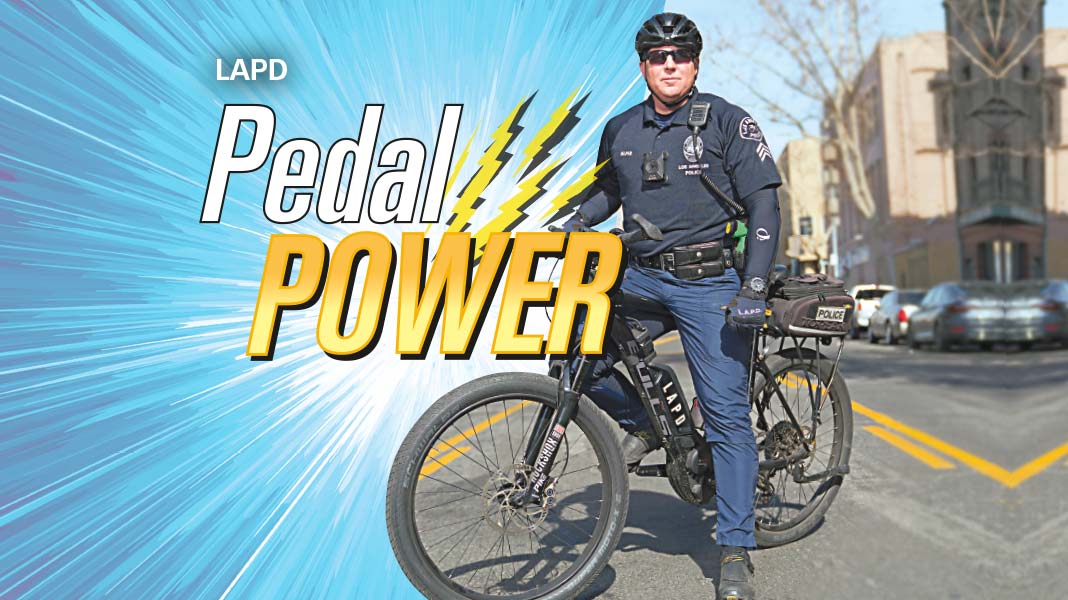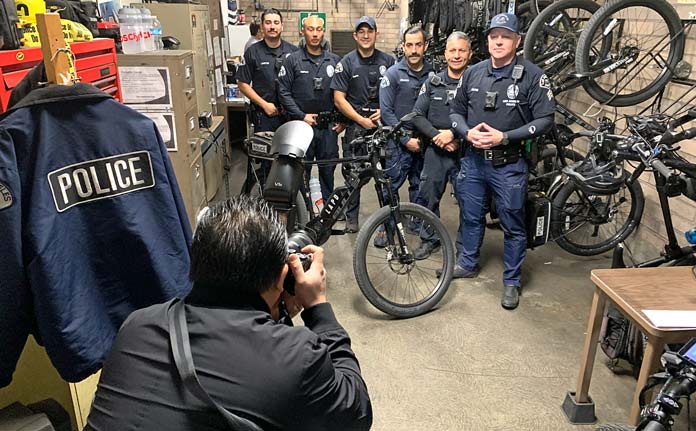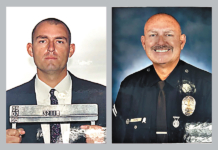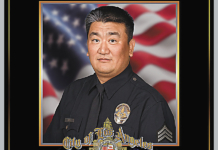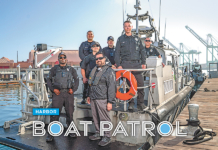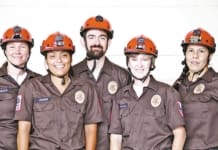Photos by Summy Lam, Club Director of Marketing;
John Burnes, Alive! editor; and courtesy the LAPD.
Police Dept.’s innovative eBike program, the biggest in the country, is revolutionizing urban policing.
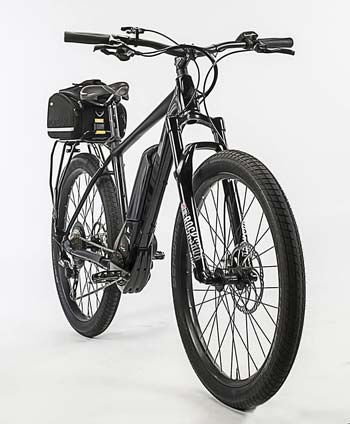
The LAPD has a new and better way to police the streets of downtown and surrounding areas – eBikes, in which electric motors powered by batteries assist the pedals, bringing the bikes up to 28 miles an hour almost instantly. Perpetrators escaping via narrow stairs or alleyways, or up ramps – all of which were problematic for naturally pedaled mechanical bikes – are being relegated to the past. Patrol cars that cannot get through LA’s notoriously dense traffic can be backed up with Officers on powered bicycles who can get through the traffic without delay. And Bike Officers at the end of their shifts are as fresh as they were when they started.
This increased effectiveness of urban policing is, in the Department’s words, radical.
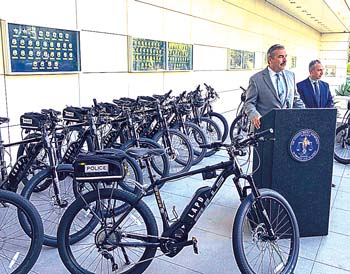
That’s all thanks to a pilot program started in 2017 in partnership with eBike manufacturers to test the new technology. That program proved so successful that it was expanded dramatically in 2018 with the purchase of 20 additional eBikes from Bulls Bikes, a German manufacturer. The eBikes, which have been distributed and are in service in the Central, Hollywood, Pacific and North Hollywood Areas, form the country’s largest fleet of police eBikes.
Read all about this nationally leading program in this month’s feature.
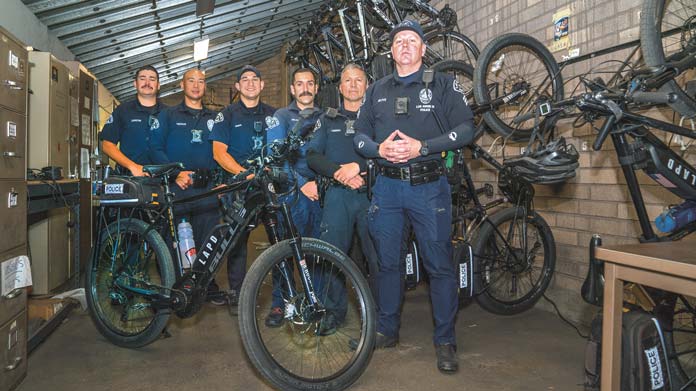

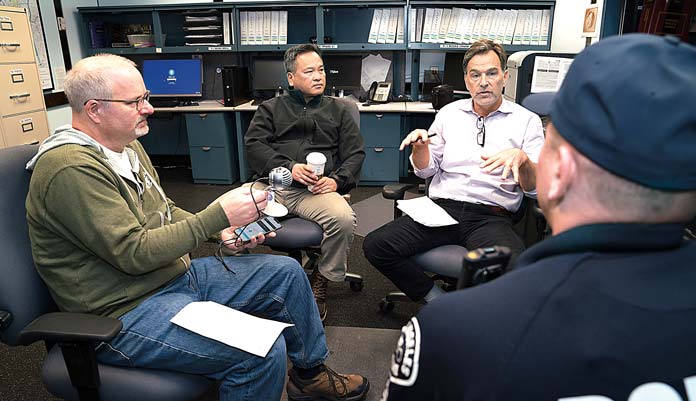
Here to Stay
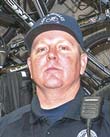
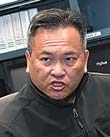
On Feb. 5, 2020, Club CEO John Hawkins and Alive! editor John Burnes sat down with LAPD Sgts. Sam Gong, 30 years of service to the City of LA, and Gordon Helper, 22 years. Sgt. Gong is the Assistant Project Manager for LAPD’s eBike program; Sgt. Helper is the lead Bicycle Officer on the Central Station bike platoon, including electric and mechanical (pedal) bikes.
Thanks for giving us a tour of the LAPD bike shack and repair unit. Give us a quick career recap of how you got to where you are.
Sgt. Sam Gong: Initially, I worked in Central Division. I got involved with the bicycle program in about 1992 or ’93. I started riding bicycles here at Central Division for about three or four years, then I was promoted. I came back full circle about three years ago. Chief (Charlie) Beck said to me, “Hey, we need to look at this technology, and I understand that you’re one of the eBike riders of the department.” So I was recruited into developing a product that was viable for the department for the Chief to look at.
Sgt. Gordon Helper: I came onto the job in 1998. After I got off probation, I wheeled out to Wilshire Division. I was working patrol there and I immediately went into the Bike unit. I’ve been involved either with the bicycle program or on an active bicycle unit since 2000.
You started out on what I would call a pedal bike, a mechanical bike?
Sgt. Gordon Helper: Yes, a mechanical bike. We had them in Wilshire Division. I was there for six and a half years working there, the Mid-City area, the Beverly Center. At that time Wilshire Division was really big. It went all the way out from Vermont to La Cienega, and from Beverly all the way to the 10 Freeway. It was a huge division. That really got me into a lot of riding; we used to ride out to the East side, to the West side and to the North side, from where Wilshire Division was.
 Advantage: Personal
Advantage: Personal
How many miles a day or a week were you riding?
Sgt. Gordon Helper: We were putting in maybe 50, 60 miles a week. At least.
Sixty miles a week!
Sgt. Gordon Helper: On mechanical bikes. With 60 pounds of gear. Everything. The gear hasn’t gotten any lighter.
Sgt. Sam Gong: If anything, heavier.
Sgt. Gordon Helper: The eBikes are getting faster, but the gear’s not getting any lighter. We’re having to carry more.
We at the Club have been riding eBikes all over downtown to do our daily service to Club Members, to stock the Club Store, and so on for the last six months. One of the advantages of an eBike is the weight. We have cargo to carry around. With the eBikes, suddenly weight isn’t a problem. That’s got to allow you to perform better as a cop – you’re not worrying about carrying the weight of the equipment.
Sgt. Sam Gong: In addition to that, it’s the daily riding of the bike. Our Officers patrol 365 days a year. Some of those summer months are very hot. The Officers wear their bulletproof vests, and that in itself adds another 10 or 15 degrees to the core temperature. If you could get the Officers to ride a little bit faster and get some air underneath their vests, that helps with the Officers’ longevity and stamina. They’re working these 10-hour or 12-hour shifts, and it gives them a little bit more air. That keeps them fresher for a little bit longer.
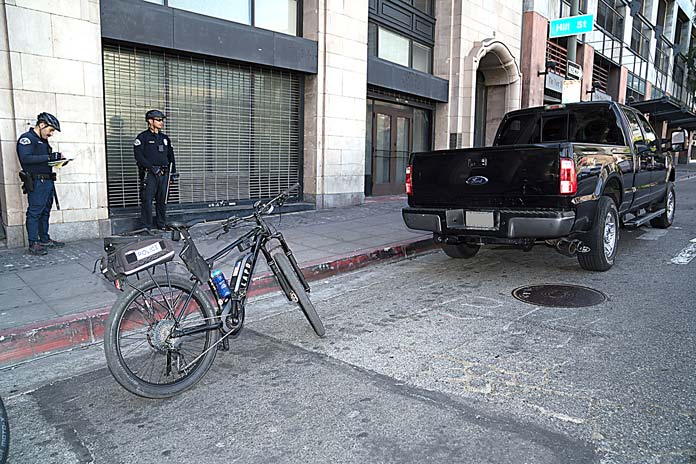
And no more head winds. Those can be tough.
Sgt. Gordon Helper: Right. There’s no more head wind, there’s no more tail wind, there’s no more height. You’ll get a little bit more speed going downhill, because the bike’s a little bit heavier, but that’s okay with me.
 Advantage: Tactical
Advantage: Tactical
What kind of capabilities do these modern eBikes give you that you wouldn’t have without them?
Sgt. Gordon Helper: It’s the response to calls. Suspects run on foot or in cars. There are bad people in this world, and they run from us. Before, if a car decided to take off on us, if you’re on a mechanical bike, it was like, “Adios.” I’m not even going to try. They’re gone. I’m not going to risk anybody. I would be so smoked [tired] at the end. I’ll be too tired to put them into a prone position, even I were to catch them. I can call it in on a radio, but I won’t be able to catch them.
So now, on the new eBikes, if somebody runs from us, they’re not going to go anywhere, especially in downtown traffic. There’s nowhere to go. They’re going to hit a light or do whatever they’re going to do, and you’re going to catch them, especially on these bikes.
Even with the heat of the day, after riding the eBike all day, I’m still not tired. I can still go home, play with my daughters, hang out with them, do whatever. In the summertime on a mechanical bike, when I got home it was first thing shower, next thing bed.
I used to be a big adversary of eBikes. I thought that Officers should be out there exercising. But my philosophy has changed. I’m a big proponent. The Officers have to be excellent bicyclists and fit before they ever join this unit. E-Bikes lead to better policing. We need them in this department.
Sgt. Sam Gong: Not only are eBikes cutting our response time, they’re giving us a greater patrol radius as well. Before, for example, on a mechanical bike, your patrol radius might be five miles. But now eBikes can increase that radius, because these things are going faster.
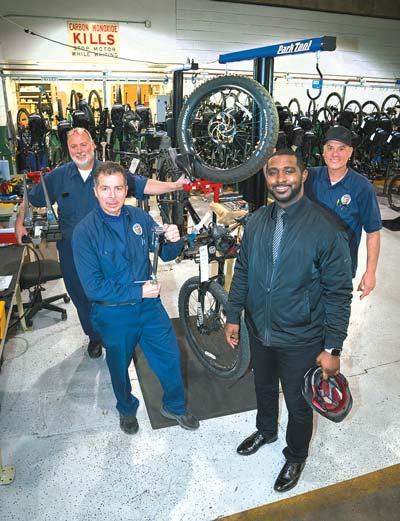
Increase the radius by how much?
Sgt. Gordon Helper: I would say double. You would ride out to a location, and you would work maybe a three or four-block radius looking for dope or other people breaking the law. Then you would make the arrest and ride all the way back. Now, you can ride anywhere, do anything and go anywhere for as long as you want, or go to a different location at the end of the day. We can go to the Staples Center on the far southwest side of our division, or we can go up to Dodger Stadium or work up on Broadway in Chinatown. It doesn’t matter. I can be there in less than five minutes. I’ve beaten patrol cars to radio calls. At five o’clock in the afternoon downtown on a Friday, I can beat a patrol car to the Staples Center.
What’s your scheduling like?
Sgt. Gordon Helper: We’re a mid-day watch. We work 11 a.m. to nine o’clock at night, so we get both of the day parts when things are going on – when it’s busy, when people are out, when the call load starts to generate in the City.
There are four divisions that have eBikes currently. Do they work similar schedules?
Sgt. Sam Gong: Hollywood, which is the same size as Central here, works around the clock, and they have an entertainment district. Their watch extends well beyond this watch. Sometimes they’ll go until 11 p.m. or midnight, depending on which day of the week it is. On weekends it’ll extend little bit more. Central and Hollywood are the two biggest, with 10 eBikes each. Central is every day. Hollywood is almost every day.
Sgt. Gordon Helper: Hollywood has movie premieres and other events like that. Central has a lot of protests and marches. Plus, we have all the parades here. This is not taking away from any other division, but Central Division has always had the busiest bicycle unit in the City.
The other divisions with eBikes …
Sgt. Gordon Helper: North Hollywood and Pacific. Pacific’s eBikes have fatter tires so they can patrol Venice Beach. They ride on the sand.
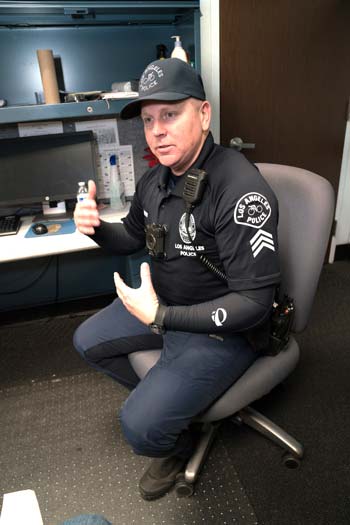
Do eBikes affect community policing?
Sgt. Sam Gong: We’re more approachable.
Sgt. Gordon Helper: We’re more approachable than an Officer would be in a black and white. We’re next to the people walking on the sidewalks. We set up on the sidewalks next to the curb. People walk up to us all the time and ask us about the bikes, either eBikes or mechanical. I’ve talked to thousands of people about the bicycling program in the City of Los Angeles. What surprises me to this day is people, especially visitors, who say, “Oh, look. They have cops on bicycles here in LA.” I’ve been doing this more than 20 years. How have you never seen Officers on bicycles? I can’t understand how people haven’t seen that before.
Is there a parallel to the equestrian unit in that way?
Sgt. Sam Gong: They’re a high-visibility patrol.
Sgt. Gordon Helper: Sometimes we’re stealth. You can’t be stealth on a horse!
We do buy-bust operations. We send an undercover Officer in to buy dope from a suspect, and as soon as a buy is made, they will send bike Officers in because we get in so fast before the suspect can even run away.
Okay. So do you work with other divisions?
Sgt. Gordon Helper: We work with other entities, yes. And sometimes with other divisions for large-scale deployment, such as the MLK parade. That just happened. That’s a huge footprint. They need multiple bike units from throughout the City for that, so we will all deploy there.
Which brings up another thing about scheduling. Our hours might be scheduled for something going on, like scheduled parades or demonstrations or big events. We’re working on scheduling for the Kobe Bryant memorial, for example.
What happens when it rains?
Sgt. Gordon Helper: We might take temporary shelter inside a black and white until it stops. We are the same as any Officer who’s operating a police vehicle. That’s a big misconception out there. I’ve even had people ask me, “Hey, when you qualify to drive a car, do you think you’ll [leave the bike detail]?” And I’m like, “Seriously?” We’ve already qualified. We can drive cars. We just choose not to take out a car. There are no cars assigned to my bicycle unit, because we do not take cars. I’d rather have these guys out on bikes every single day, all year long, except when it’s raining. Because rain …
… is a pain.
Sgt. Gordon Helper: It is.
 Training
Training
In patrolling on the streets all day, the bike’s “turbo mode” has to help you.
Sgt. Gordon Helper: Yes. There are four different modes on this bike. You can put it all the way down in eco mode and get a heck of a workout at the end of the day.
But when you need that power to pursue or to get to an incident, you can put it in turbo.
Sgt. Gordon Helper: It’s a flick of a thumb. You’re up to turbo mode and you’re gone to do your work.
But these are not throttle bikes – these are pedal assists. You are doing some work. It doesn’t just go 28 miles an hour on its own. You have to pedal up to it and change gears. You have to know how to operate a bicycle. I would not recommend people who have never ridden a bike before to just jump on an eBike and go ride it.
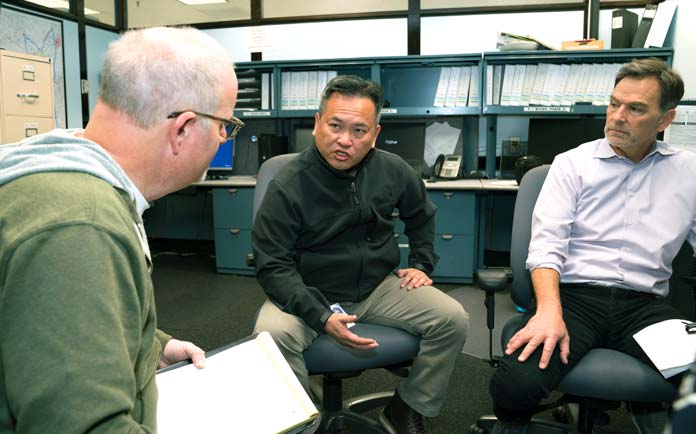
Sgt. Sam Gong: Even for our Officers. They have to get certified to ride an eBike, in addition to basic bicycle school.
Sgt. Gordon Helper: It’s a different class.
Sgt. Sam Gong: You can’t be trained just on a regular bike and think, “Hey, you know what? Tomorrow we’ll have eBikes and we’ll jump on it.” No. You have to be certified to ride the eBike.
Is that certification at the LAPD Academy?
Sgt. Sam Gong: Yes. Certification to ride the eBike takes one additional day. Most bike Officers are regular police Officers first – line platoon Officers first before they get selected for the bicycle detail.
 Program History
Program History
Why did Chief Beck start the eBike program?
Sgt. Sam Gong: I think the Chief saw the benefits of this eBike as a tool for policing. Any time a manager sees something that can make their employees’ job easier and better, in whatever organization, they’re going to explore that technology. The Chief saw the benefits of this eBike.
Sgt. Gordon Helper: Chief Beck went through my bike school, and I trained him. He had a lot of fun, but he wanted something faster than a mechanical bike. Chief Beck had a Motocross background and loves bikes. He loves two wheels. He wanted something a little bit more that would get us there to the call a little bit faster, and I think that’s why he came to Sam to develop something to get these guys around little bit quicker and get the job done as fast we can.
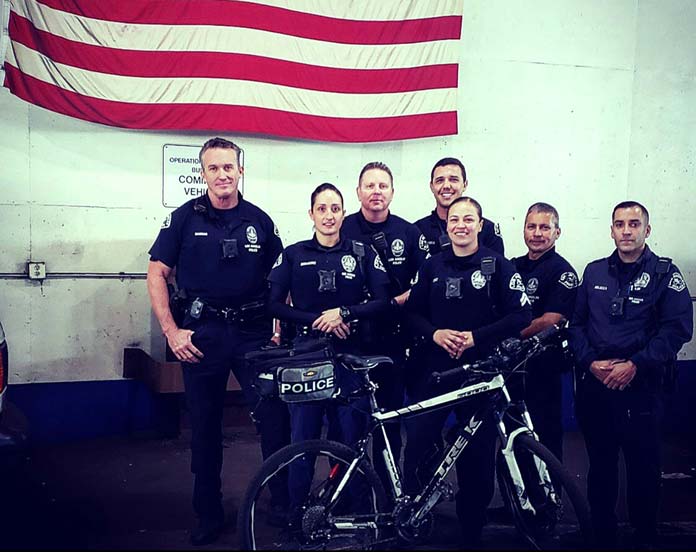
Was he a pioneer of this usage in the country?
Sgt. Gordon Helper: It happened in his term.
Sgt. Sam Gong: His vision reshaped how we patrol, especially urban area, with bicycles. We get there faster. The cops are not as tired when they get there, because of the technology.
Sgt. Gordon Helper: I don’t understand why there aren’t more departments that have this, especially in an urban atmosphere, where you have a downtown, like San Francisco – can you imagine? You’d be flying around San Francisco.
Sgt. Sam Gong: In Hollywood, the ride to the Hollywood Sign used take them two or three hours from the division. Now they were able to get up there within 45 minutes.
Sgt. Gordon Helper: And then go to work. Before, once you got up there, you were done.
And I just want to mention our current Chief, Michel Moore. He’s responsible for expanding the program to add new bicycles and several different Divisions, bringing our totals up to 40 Officers being eBike-certified. He supports what we’re doing.
You had to help design an eBike that would hold up to the wear and tear of police work. These are used harder.
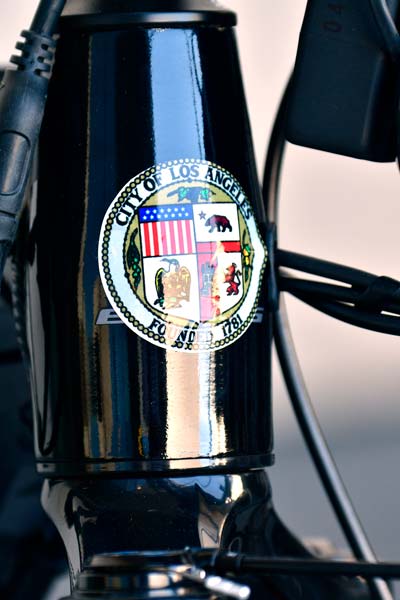
Sgt. Sam Gong: Right. Remember, this technology wasn’t really available to the masses. A viable eBike for police work was not really there until the Los Angeles Police Dept. explored technology and found a bike that was capable of doing the type of work that we do in the field.
Then we had to modify a bike to be robust enough to handle police work. The frame has to be extra heavy duty. We approached Bulls Manufacturing, and they had internalized the hydraulic cables inside the frame. We told them, “We can’t have this, because the stuff that we do is for duty use. We want the cables to be outside so we can service them quickly.” They did that.
No manufacturer would think of something like that. Or the kickstand. We can’t have retractable kickstands because of the type of work that we do. The (pedal) cranks had to be little bit more robust. Everything about the bike had to be heavy duty, because these things cannot fail. When somebody calls 911 and your equipment fails, somebody’s injured or somebody’s dead. These things have to work one hundred percent of the time under heavy usage.
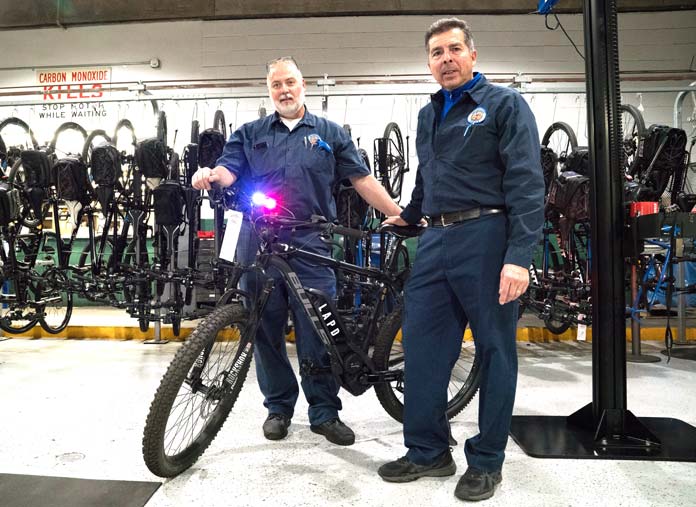
Manufacturers alter cars for police duty, so it’s the same for bikes.
Sgt. Sam Gong: Yes.
What about tires?
Sgt. Sam Gong: We went through a selection process with finding the right tire. An urban type situation requires a different tire than the beach, which requires fat tires so the bike won’t sink into the sand. We call those fat bikes. North Hollywood might use a different bike because they patrol the trails. So they need a hybrid tire where it has knobbies that work on the street, too. The bikes go through a rigorous testing process. We just don’t blindly go in and buy something and adopt it for police work. It goes through extensive testing before we could put it in the street.
There was no viable product on the market at that time. We developed this product for the entire country. A lot of agencies are using this model. It’s called the Sentinel.
Sgt. Gordon Helper: There are tactics that we do as police Officers on bicycles. If the down slope of the top tube on the frame is too low or too high, we can’t do this tactic, we can’t do that tactic. If there’s too much weight on the back, we can’t do a power slide. If there is too much weight in the front, how do I do a step-through dismount? Sam worked with Bulls to meet those requirements. And our bicycle coordination unit tested them before we put them in use.
Sgt. Sam Gong: We teach Officers to shoot from a bike because they might get ambushed at a traffic stop. The geometry of the frame of a normal bicycle is not quite right for that. It has to be something similar to what our Officers are used to, but also has to be electrified. That really narrowed down our selection to just a few companies that would design something to meet our needs.
Sgt. Gordon Helper: We have to look at the bike through a different perspective.
Sgt. Sam Gong: The only limitation on our eBikes is that they don’t have a computer to do the Officers’ checks. They have to do everything on the radio.
Sgt. Gordon Helper: You have to call for a unit to do an MDC check, which means we have to run people on their cars and stuff like that. But adding computers is something we’re looking at in the future.
 Signs of Success
Signs of Success
Yes. What are some of the signs of your success?
Sgt. Gordon Helper: There was quite a significant difference between when we were riding the mechanical bikes and when we transferred over to the eBikes. The re-cap level (citations, violations, arrests, etc.) actually went up, because Officers wanted to be out there riding the eBikes. They were testing the capabilities.
In the beginning of that first year we had a decent re-cap in the first six months before we got the eBikes. But as soon as we got those eBikes, I mean, it went up, I’d say, 10 times.
That’s incredible.
Sgt. Gordon Helper: Yes, and these Officers were actually going to a lot more radio calls, too, because they weren’t tired when they got there. I was doing it. I was actually responding to a lot more radio calls, because I wanted to see how far I could test this bike. I would respond from the station to the Staples Center on a call to see if I could beat the police vehicle there going Code 3 with lights and sirens. And I still beat them.
Do the foot-beat cops ever get jealous of you guys?
Sgt. Sam Gong: No – there’s a certain niche of people who fall into those categories. Some people like walking the foot beat.
Sgt. Gordon Helper: Some people don’t want to ride a bike at all
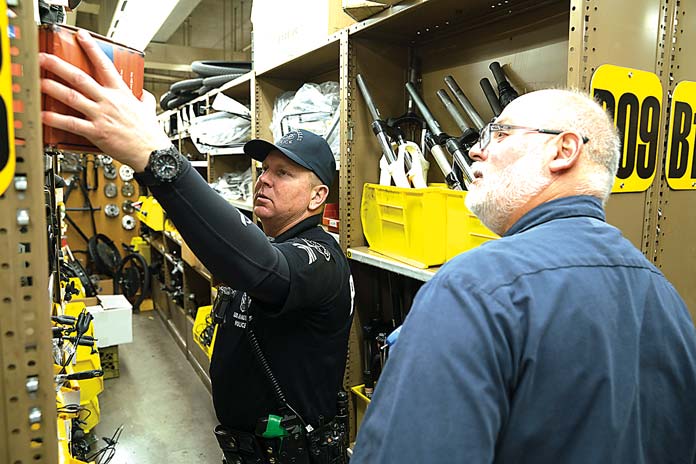

Stories
Tell us some of your stories of great policing through eBikes.
Sgt. Gordon Helper: I was doing a traffic stop on Seventh and Figueroa – the guy made an illegal right turn on the “No right turn” sign. I went up to him and I said, “Hey, sir, I’m Sgt. Helper, Los Angeles Police Dept. You pulled a right.” We have to identify ourselves when we’re working a bike unit because people will not know who we are. They’ll think we’re delivering a pizza. He looks at me and he says something like, “That’s mildly interesting. I don’t care who you are.” He hits the gas. He goes about two blocks eastbound on Seventh Street, makes a right, and then goes down the street towards the Macy’s mall, and he decides to pull in that parking structure going all the way up. You know, it goes all the way up, in a circle. He goes up seven stories in a really tight circle.
On a mechanical bike, I would have just let this go. But not this time.
I was new to the eBike, and I decided to give it a shot. So, he hits the gas. He’s not going very fast. He’s not driving crazy, so I can actually do this safely. As soon as he hits the parking structure, I’m literally right behind him saying, “Hey! I’ll meet you at the top.”
There was nowhere for him to go, because I knew there was a gate at the top. As soon as he got up to the gate, I came back up to him. I said, “Are you done yet? Are you done playing around?” He was waiting for the ticket to come out. I said, “Dude, this is only going to get bad for you, if you keep running.” He says, “I’m trying to get to work!” I say, “You’re evading the police now. Do you understand that?” He parked there. I took him out of the car. My other bike units all came up with police cars. I took him into custody. He had no driver’s license. We ended up impounding his car. And I think he learned a very valuable lesson – the eBike was here to stick it out. You can’t get away.
He thought he was going to shake you.
Sgt. Gordon Helper: He did. He thought he was.
Sgt. Sam Gong: This technology has re-shaped how we handle these calls in the field.
Sgt. Gordon Helper: I can get to a call faster than most of these patrol supervisors because I’m on an eBike.
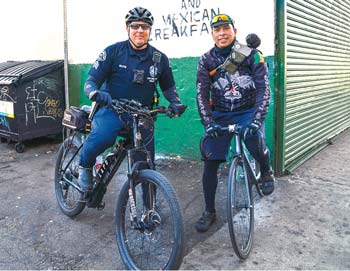
You were telling us about the bike couriers.
Sgt. Gordon Helper: Yes, so, the bike messengers used to always look at us and say, “Whatever dude!” When we were on the mechanical bikes, not the e-Bikes.
You mean, on the fixies?
Sgt. Gordon Helper: Yes, the messengers on the fixed-gear bikes. They all ran from us when we were on (pedal) bicycles. They’ll go through traffic lights. That mechanical bike with all the gear, we aren’t chasing anybody’s fixie. As soon as we got these eBikes, I was waiting over at Sixth and Spring and, sure enough, the fixie came by and he blew the light. He looked at me, and I went after him – boom! I was on him. He started pedaling as hard as he could. And he’s looking at me and he’s breathing hard. I just said to him, “You done yet? Can we talk?” I was clear as day, with no hard breathing on my part.
Maybe a yawn.
Sgt. Gordon Helper: Word got out really quickly after that – now the bike messengers all know that Central has eBikes. No more of that running red lights and stuff like that.
 Openings
Openings
What do you love about what you do?
Sgt. Gordon Helper: The freedom. You’re not restricted to the radio calls. I can go to a radio call if they’re there and it makes sense. It’s different every day. Tomorrow I have a protest in the morning. Friday I had a Lakers game. Last Sunday I had the Grammys and then, during that Sunday, I had the Kobe Bryant memorial.
Do you need more Officers on bike patrol?
Sgt. Gordon Helper: I need them and I want them.
My dream for the Central Bike Unit is to have 12 Officers. I would like to have six on middays and six on mid-PMs.
How many do you have now?
Sgt. Gordon Helper: I have only five bike Officers. I would like to have 10 more because there are vacations.
Any new police Officer who comes on the job will have to go through the Academy. They have to go to their division for a year to make probation. But as soon as they get off probation, they are eligible. And it counts as your patrol time. You need three years minimum patrol. This bike unit qualifies as patrol time.
 The Future
The Future
Are eBikes the future?
Sgt. Gordon Helper: Yes. They’re the future, but they’re right now. We need them in our department.
And what do you see 10 years from now in terms of eBikes?
Sgt. Gordon Helper: Ten years, it’ll be the Olympics here in LA. The All-Star game. Super Bowl. The World Cup. Plus so many other events.
Sgt. Gong: The batteries will get smaller. The motors will get smaller and more powerful. I don’t think the eBikes are going away.
Sgt. Gordon Helper: The eBikes have proven themselves. They are here to stay.
Well, Sergeants, thank you very much for your time. We appreciate the interview and being given the tour.
Sgt. Gordon Helper: Of course.
Sgt. Sam Gong: No problem.
BEHIND THE SCENES
Club Director of Marketing Summy Lam (foreground) photographs the LAPD eBike unit inside the bike shack in Central Division downtown. |


